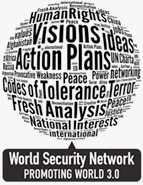The West needs Holistic Formulas for Peace on the basis of Diplomacy plus Power plus Reconciliation

Archbishop Alfons Nossol is a close and influential friend of the Pope's. They were both professors at the Catholic University in Lublin in Poland. He is a dedicated Christian conciliator and, in my view, living proof of the fact that peace between the peoples of formerly hostile countries is indeed possible. In the Vatican, he works in the Papal Committee for Interdenominational Dialogue.
We first met in 1989 in Kreisau, the former base of the group known as the "Kreisauer Kreis", one of the activist resistance groups against Adolf Hitler, whose members were executed after July 20, 1944 following Count Stauffenberg's attempt to assassinate the "Führer" in a bomb attack. At the time of our encounter, the Archbishop of Opole, was holding a reconciliation service for the Poles who have been living in Silesia, a region which was part of Germany for many centuries, since 1945 as well as the large German minority currently estimated at 800,000, which remains oppressed to this day. The German Chancellor Helmut Kohl and the Polish Prime Minister attended the service – a magnificent celebration of peace in Europe. This was the beginning of a process of reconciliation in the hearts of the German and Polish people – a reconciliation that went deeper than a mere rearrangement of national borders.
Although his friend, the Pope, would have liked Archbishop Nossol to have joined him in the Vatican, he chose to remain in Opole, a small town in Upper Silesia, in a region caught between many different cultures. He brought Germans and Poles together, healing the wounds inflicted by the expulsion of millions of Germans – my own parents among them – from Silesia on the one hand, and those which hail back to the murderous rampages of Hitler's thugs in Poland on the other.
In an exclusive interview with Worldsecuritynetwork.com, this competent and experienced peacemaker explains how true peace can be brought about between peoples. As the great philosopher Immanuel Kant very aptly observed, this is not a "natural state" but requires "peacemaking" by courageous men and women – people like Alfons Nossol. Those who take up this calling must often proceed in the face of loneliness and hostility.
His article is thus dedicated to providing both encouragement and inspiration to peacemakers in Europe (the Balkans), Africa (Liberia, the Congo), the Middle East (Palestine/Israel) and Asia (Indonesia; Pakistan/India).
Yes, a deep and lasting peace is indeed possible if the following can be achieved.

Yes, a deep and lasting peace is indeed possible if the following can be achieved.
- The past, however harsh it may have been, must be worked through – by forgiveness and reconciliation – but not forgotten. This opens people's hearts and minds, paving the way for a new start and a better future.
- We must welcome tolerant patriotism, while checking and combating nationalism and chauvinism, nipping them in the bud.
- We must learn to see the other side – our former or present foes – as human beings and as neighbors. We must overcome stereotypes and a true unity must blossom where mutual hostility or mere co-existence once reigned. Children must not be brought up to hate others.
- We must show determination in preventing expulsions and ethnic cleansing measures right from the outset. It is not enough for us to lament them hypocritically after the event. We must strike consistently and vigorously at the root of inhuman destruction and the glorification of violence – at terrorism.
- We must change our outlook, encountering our "old enemy" with a "thoughtful heart and a loving mind". We must be ready to make the first gesture, not just waiting to see what the others will do while keeping a mental tally.
- We must open the hearts of our present-day enemies through generosity and specific aid.
I am confident that our Western "peace policy" is in urgent need of these elements of Christian conciliation, but forgets to apply them in day-to-day life.
Our thoughts and our actions are still excessively dominated by diplomatic set phrases and rhetoric on the one hand and operative military planning on the other. Neither approach is wrong, but in Alfons Nossol's experience, this is nowhere near enough.
For each and every conflict, we need a holistic formula for peace based on diplomacy plus power plus reconciliation. Only in this way, proceeding in many hundreds of small, painstaking steps, can we achieve true and lasting peace between peoples who have long been enemies.








Comments